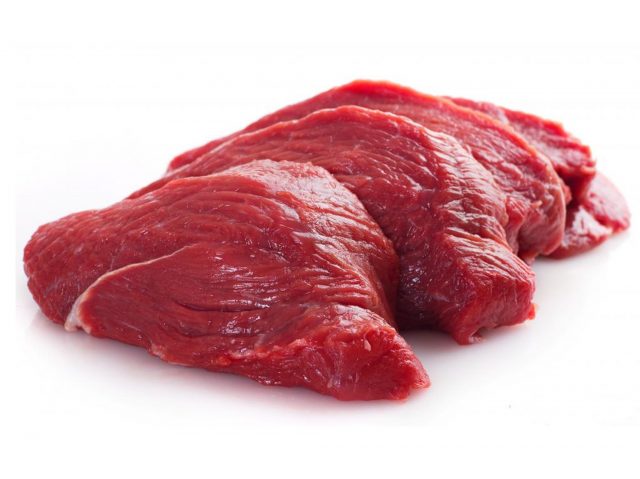Britons are steadily ditching meat and fish as costs soared in recent months
Figures show sales of every type of meat and fish have nosedived in 12 weeks
It’s thought millions of families are cutting down on meat due to cost of living
Elsewhere, grocery stores are making £4.68 billion from vegetarian consumers
Cash-strapped Britons appear to be forgoing expensive cuts of meat and fish in an effort to save money as the cost of living crisis continues to bite.
Volume sales of every type of meat, fish and poultry have nosedived in the past 12 weeks compared to the same period last year as prices have soared and only chicken has seen a rise in spending, though it is only an increase of 0.6 per cent.
It is thought some families may be switching from expensive cuts to cheaper chicken options for their protein.
Year on year comparisons by analysts Kantar for The Grocer show the amount of chicken sold is down 9.7 per cent, compared to falls of 13.7 per cent for beef, 10.6 per cent for pork, 23.7 per cent for lamb and 11.6 per cent for fish.
It is thought millions of families are cutting back on their red meat and fish intake in particular.
Year on year comparisons by analysts Kantar for The Grocer show the amount of pork sold in the past 12 weeks has fallen by 10.6 per cent

The same research found the amount of chicken sold is down 9.7 per cent, although it has accrued a 0.6 per cent rise in spending

Sales of fish products over the past 12 weeks are also down by 11.6 per cent
Figures for the amount spent also suggest that many may be moving to cheaper sources of protein, hence the small but significant rise in value sales for chicken.
This comes as the amount spent on beef fell by 7.7 per cent in value, pork by 5.9 per cent, lamb by 14.4 per cent and fish by 8.0 per cent.
Recent Retail Price Index figures for food bought by ordinary shoppers showed the average price of a roasting joint of beef had risen by 9.8 per cent to £11.34 over the year to April, while chicken had risen by 10.4 per cent to £3 a kilo.
Elsewhere, the VoucherCodes.co.uk Food Spend Report reveals that vegans are consistently spending more on groceries, eating out and takeaways than the national average, with a total food spend of £14.02 billion a year (£8,760 per person).

The amount of lamb sold in the UK has fallen the most drastically in the past 12 weeks, down by 23.7 per cent

Beef sales are down by 13.7 per cent, as a recent Retail Price Index figures showed the average price of a roasting joint of beef had risen by 9.8 per cent to £11.34 over the year to April

Cash-strapped Britons appear to be forgoing expensive cuts of meat and fish in an effort to save money as the cost of living crisis continues to bite
This means that vegan consumers are spending almost a third more than the national average on groceries (£2802 per person), and twice the national average on food each year (£4,488 per person).
Vegetarian consumers also spend more than the national average on groceries each year, with an average spend of £2,928 per head per year. As a result, grocery retailers are making £4.68 billion from vegetarian consumers each year.
The report reveals that meat-free alternatives are driving up the cost of groceries for vegan and vegetarian consumers. On average, vegans spend £35 per month buying meat substitute products such as Tofu, Quorn and Seitan, and vegetarians follow shortly behind at £27 per month. In contrast, the average meat-eating shopper spends just £21 on meat.
Glesni Phillips, a data analyst for Meat Promotion Wales, told The Grocer: ‘In previous periods where there has been a squeeze on living standards, there can be shifts in demand for different proteins.
‘All proteins are experiencing increases in their average prices, but fish remains the most expensive protein, followed by lamb, and, despite one of the biggest price rises, chicken remains the cheapest protein.
‘Product choice is the main way shoppers are choosing to manage inflation now, and so shoppers are switching between cuts in order to save money.’
Many in the industry believe the falls are not part of the growing vegetarian movement but a reaction to higher prices which is affecting all sectors, not just meat products.
Oils, sauces, spreads, dairy and a host of other products have been affected by price rises caused by runaway inflation particularly to the costs of production because of the war in Ukraine and its effects on energy.
Rebecca Veale of the National Pig Association, added: ‘Knowing that consumers like to buy British pork, we do not believe that any reduction in consumption should displace British product and call on retail and foodservice to champion British meat and pay a fair price for it.
‘In order for British pork to remain on the shelves, a fair price needs to be paid to producers.’








